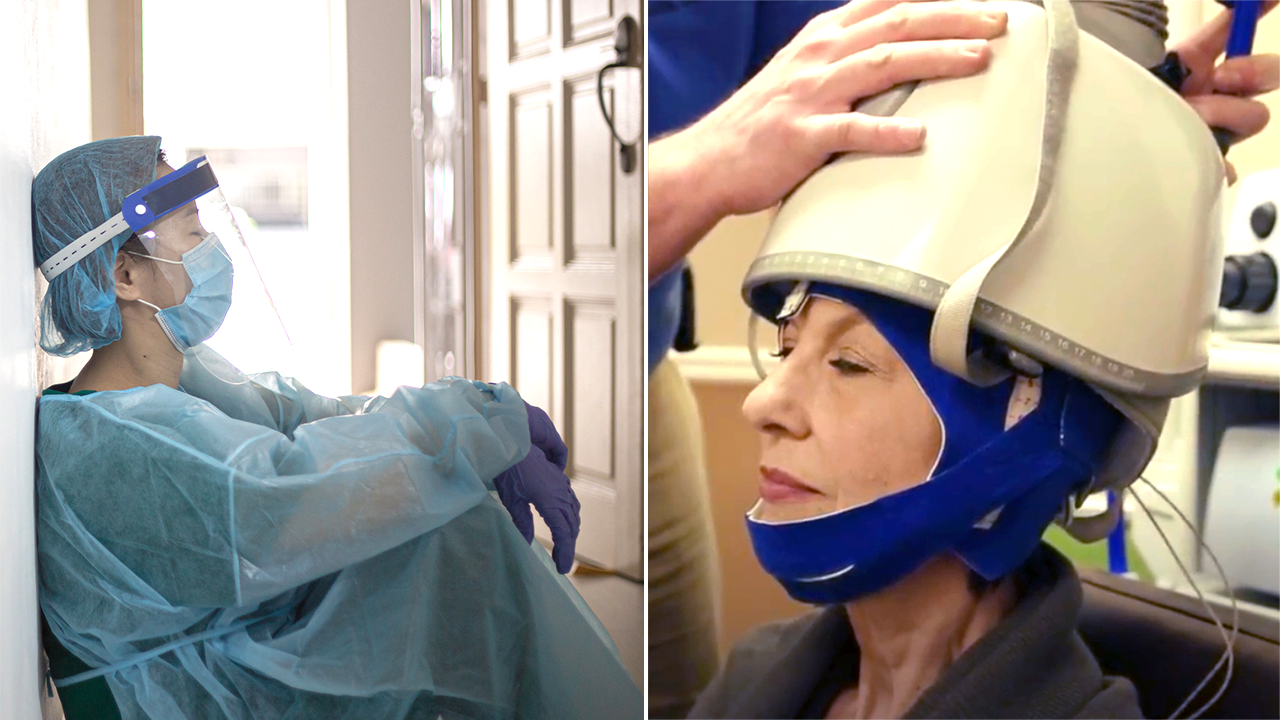
A Chicago nurse has been freed from her own mind, thanks to a mind-bending technology called deep TMS.
Gulden, who asked that her last name be withheld for privacy reasons, worked as a nurse for more than 40 years before COVID-19 upended the hospital system and took a toll on her mental health.
The mother of four worked at Advocate South Suburban Hospital in Hazel Crest, Illinois, as an ICU and ER nurse.
ARTIFICIAL INTELLIGENCE IS NOT ALWAYS USEFUL FOR REDUCING BURNOUT IN DOCTORS, STUDIES SUGGEST
In an interview with Fox News Digital, Gulden described the “enormous chaos” that the 2020 coronavirus pandemic brought to the hospital.
“No matter what we did, it felt like a failure,” she said. “We were not prepared [for] the attack of patients.”
Housekeeper Tonia Harvey changes a bed in the intensive care unit at Roseland Community Hospital after a COVID-19 patient died, April 17, 2020. (E. Jason Wambsgans/Chicago Tribune/Tribune News Service via Getty Images)
“The predictable outcome of coming in through the ER and leaving in a body bag was nothing short of devastating.”
Despite her many years of medical work, New York City native Gulden admitted she “couldn't deal with it.”
By September 2020, she was a “different person,” she said.
“I was on autopilot. I was living at work and when I got home I wasn't functioning… My ability to organize and concentrate was gone.”
NURSES CALL FOR CHANGE AS MANY REVEAL THEY ARE 'EXTREMELY LIKELY' TO LEAVE THE PROFESSION: 'EMOTIONAL, STRESSFUL'
“It was very different for me because I'm a single mother. I raised four children all by myself… but I started to notice that I couldn't let go of what had happened during the day.”
Gulden told her doctor about her symptoms, which included “terrible nightmares” that prevented her from sleeping and constant “crying” that “came from her soul.”
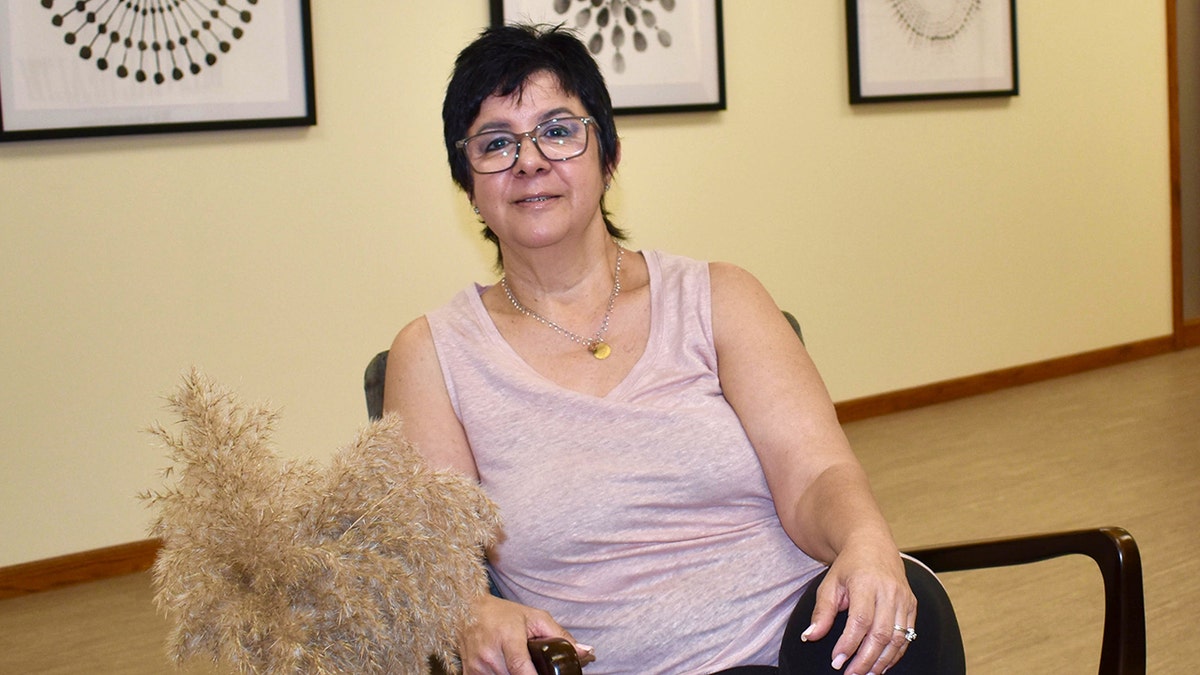
Gulden, pictured here, said working in a hospital during the coronavirus pandemic turned her into a “different person.” (Melanie Eilers)
Over the course of two years, the doctor prescribed Gulden eight different medications for sleep, PTSD and depressive disorders, along with cognitive behavioral therapy – but nothing worked.
Even after the pandemic started to slow, the nurse described how she went into a “spiral” when she realized COVID-19 was causing a “chain reaction.”
AMERICANS NEED MORE SLEEP AND LESS STRESS, EXPERTS SAY, AS GALLUP POLL REVEALS NURSING FINDINGS
“[There] was a 51-year-old who had bilateral tumors and needed a mastectomy,” she said. “She had already had her chemotherapy and radiation treatments and she was ready for her mastectomy, but she had to wait about eleven months.”
Gulden added, “By the time she came back, her tumors had grown back, and that's when I thought, this will never be over.”
Gulden said screenings for serious health complications fell by at least 84% during the pandemic, leading to a “ripple” of patients receiving care too late.
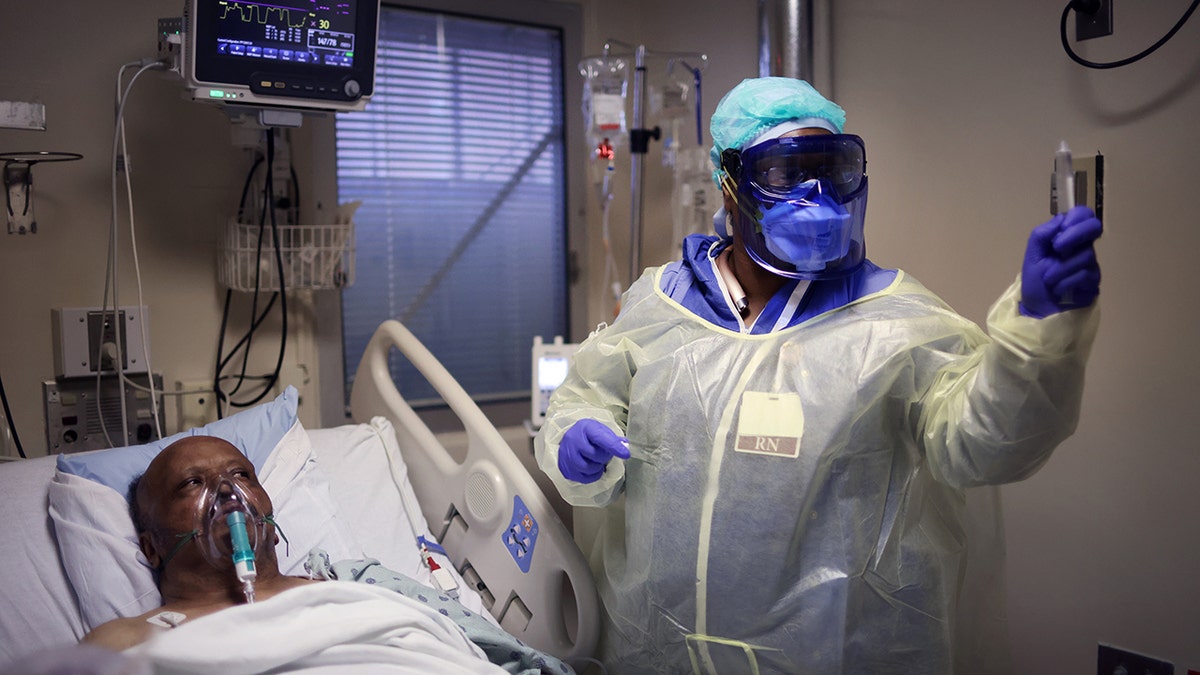
Tamara Jones gives antibiotics to James Davis as he recovers from COVID-19 in the intensive care unit at Roseland Community Hospital on December 16, 2020 in Chicago, Illinois. (Scott Olson/Getty Images)
The nurse said through tears that she decided to leave the hospital and retire because she “just couldn't function there.”
After she left, she entered a “hibernation state” where she slept 16 to 18 hours a day.
“The only reason I got up was to go to the bathroom,” she said. “And I'm ashamed to say I wouldn't shower for weeks.”
KETAMINE THERAPY HAS BEEN SHOWN EFFECTIVE IN TREATING SEVERE DEPRESSION IN VETERANS, RESEARCH DISCOVERS
“I lost 54 pounds—I got to the point where I couldn't eat anymore because everything in the refrigerator reminded me of what was on patients' trays.”
Gulden's “incredibly vivid, horrible nightmares” continued, along with other symptoms, including the inability to stay awake. She called it a “complete shutdown.”

Gulden received in-depth TMS treatment at Relief Mental Health in Orland Park, Illinois. (Melanie Eilers)
After Gulden spent three years in “hibernation,” a friend introduced her to a new type of mental health care called deep TMS (transcranial magnetic stimulation) – a magnetized tapping on the brain used to treat various conditions and diseases.
Gulden agreed to hire Dr. Teresa Poprawski, the lead physician at Relief Mental Health in Orland Park, Illinois, who helped “put the thread straight” on what was causing her PTSD and other symptoms.
What is deep TMS?
Dr. Aaron Tendler, a psychiatrist and chief physician at BrainsWay, a company that treats brain disorders, discussed how the therapy works in an interview with Fox News Digital.
Tendler is located in West Palm Beach, Florida and was not involved in Gulden's care. He said the brain is primarily an “electrochemical organ” that sends messages to different parts of the body.
'PANDEMIC SKIP', A COVID MENTAL HEALTH PHENOMENON, COULD DELAY MAJOR MILESTONES, EXPERTS SAY
Most symptoms, including depression and anxiety, are controlled by changes in the brain, Tendler said, which can be treated electrically.
Deep TMS is a more “targeted” approach than electroshock therapy, he told Fox News Digital.
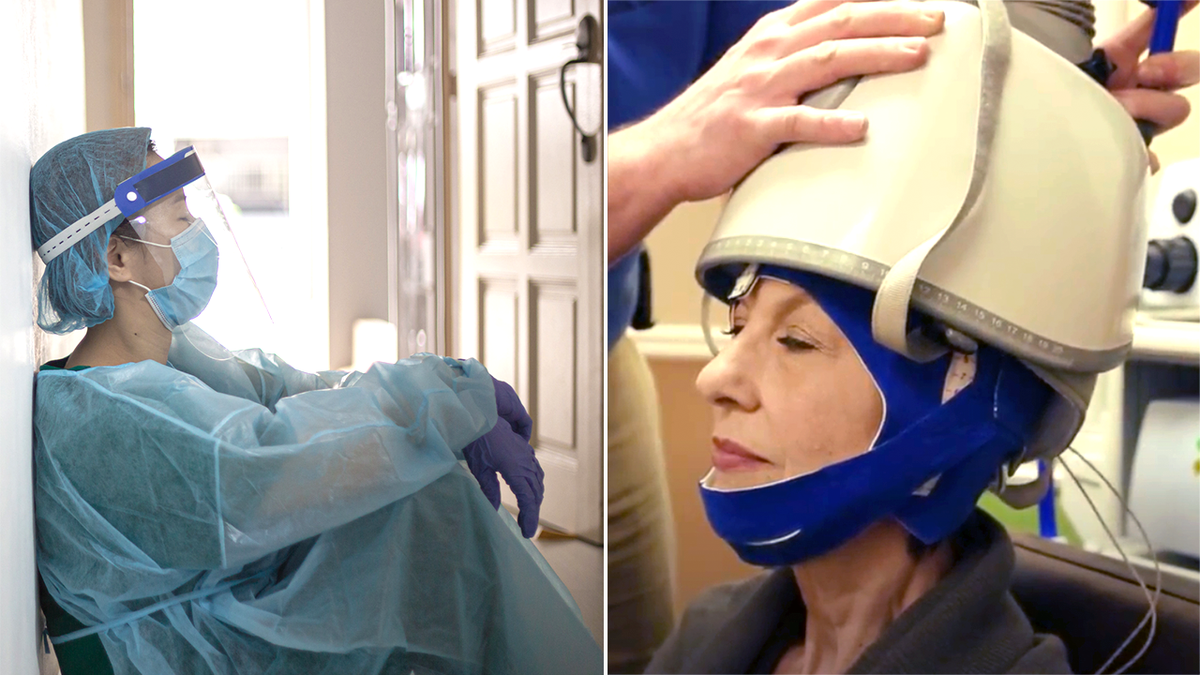
Gulden described the sensation of deep TMS as “tapping on specific parts of the brain.” (iStock; BrainsWay)
“Transcranial magnetic stimulation uses the principle of electromagnetic induction, in which magnetic pulses induce an electrical current in neurons,” he said.
“Essentially, we're changing the electrical activity in a group of neurons in one part of the brain.”
The COVID-19 pandemic has caused “collective trauma” among American adults, a new poll says
These magnetic pulses stimulate only a specific part of the brain for “a short period of time,” he said, with treatments lasting between six and 20 minutes. Patients undergo treatments over a series of days, depending on what is needed.
Tendler described the therapy as a “learning experience” that changes “the state of the brain” through repeated treatment.
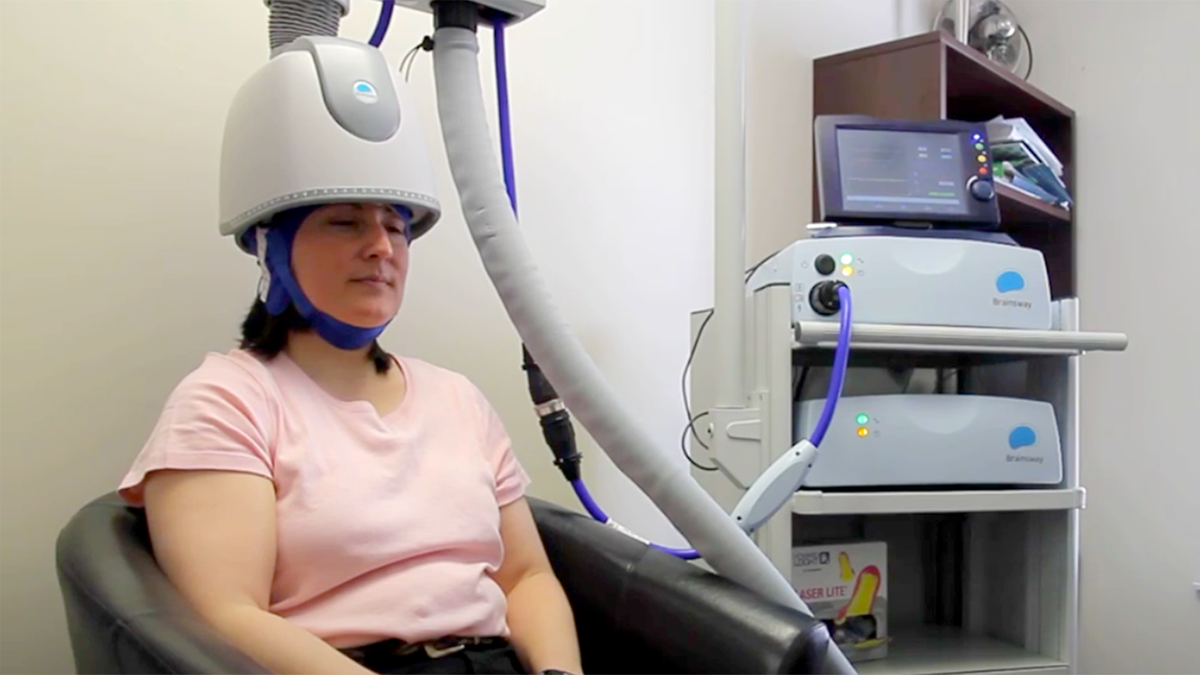
Deep TMS interrupts the activity in the brain that creates unwanted patterns, according to an expert. (BrainsWay)
Gulden received deep TMS treatment five days a week for six to eight weeks. She described the sensation as “tapping on specific parts of the brain.”
After three weeks, she reported a noticeable difference in her cognitive state.
“I realized, 'Oh my God, it's been three years since I heard the birds,'” she said. “I see life again. I see my flowers. Before, I couldn't even look at the flowers because they only reminded me of funerals.”
PASTOR BASED IN DALLAS SHARE DEPRESSION JOURNEY, ENCOURAGES OTHERS TO SEEK HELP: 'DON'T HESITATE'
Gulden described her quality of life as “so much better” since receiving treatment.
She still attends cognitive behavioral therapy sessions to sharpen her coping skills, she said.
“And if I need in-depth TMS again, I'll be right there,” she added.
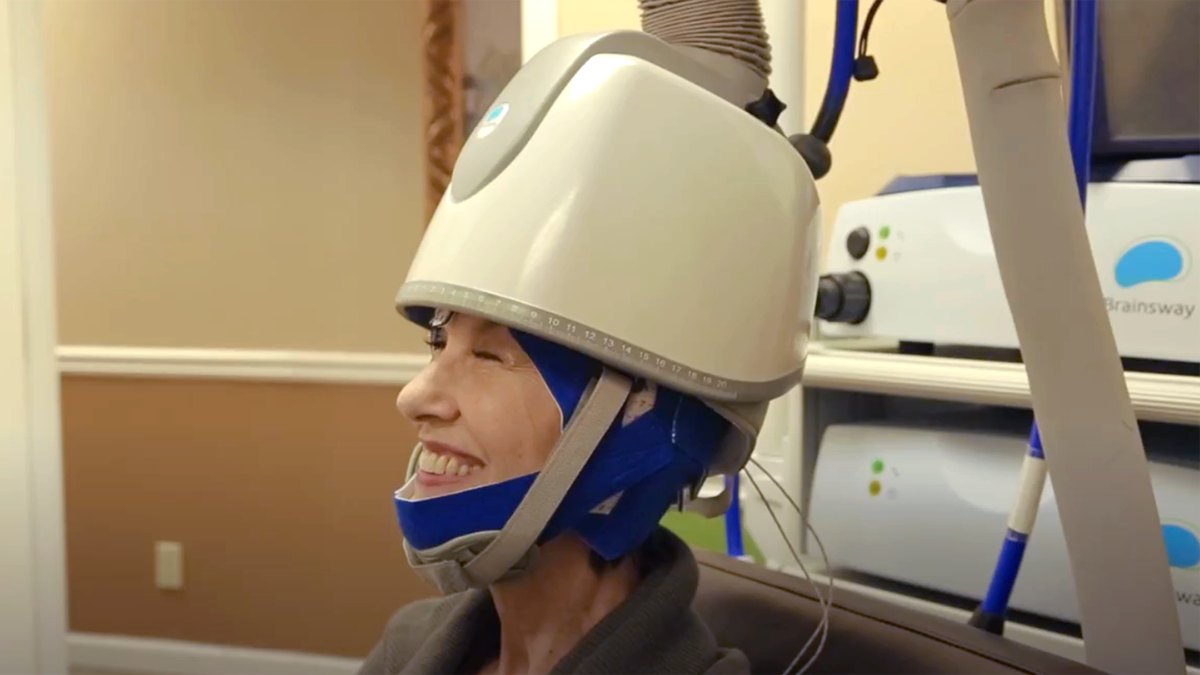
According to an expert, Deep TMS is covered by “every insurer” across the country. (BrainsWay)
'Very useful tool'
Gulden's goal is to teach others not to feel ashamed when seeking help for their psychological problems.
“I want people to know there are interventions,” she said.
“The medications didn't work for me. If I hadn't had this treatment today, I don't know where I would be.”
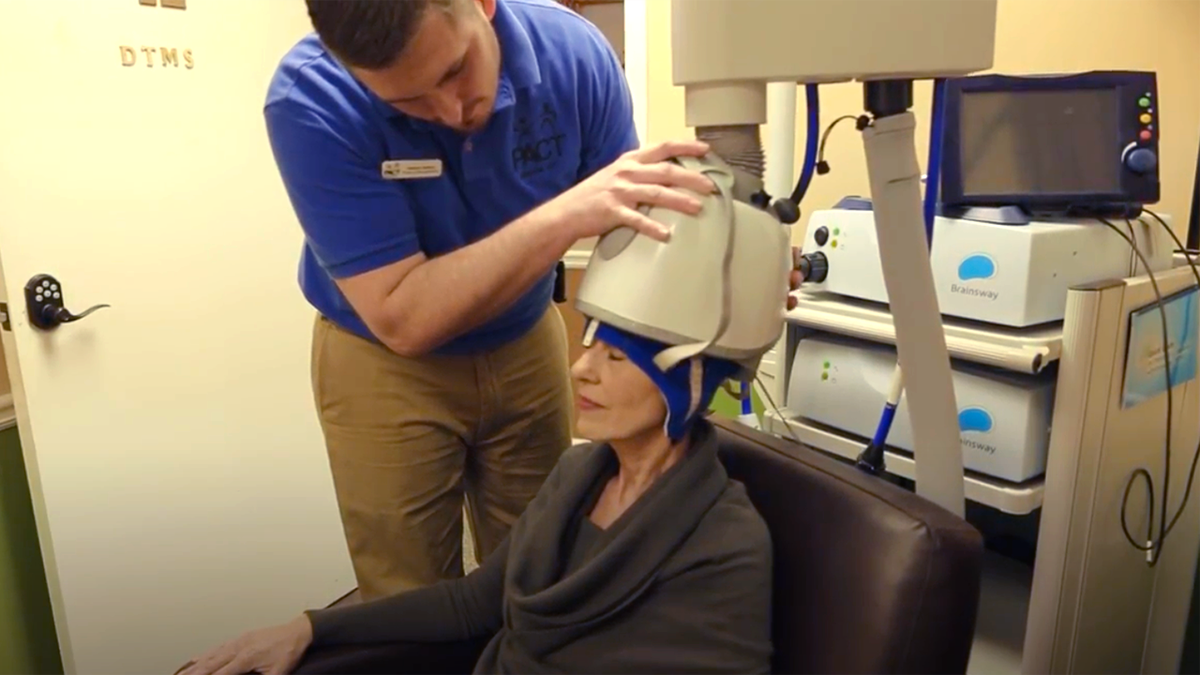
Although deep TMS technology was developed in the 1980s, the first treatment application for depression was approved by the FDA in 2009. (BrainsWay)
According to Tendler, most patients experience a 40% to 50% improvement after four weeks of treatment.
After completing a typical course of 36 treatments, patients have shown a 75% to 80% improvement, he said.
CLICK HERE TO SIGN UP FOR OUR HEALTH NEWSLETTER
Deep TMS is “not a cure,” Tendler said, but many patients can return to normal function for months or years at a time.
The electrical therapy does not have the potential side effects that antidepressants and other treatments can cause, Tendler said, noting that the brain manipulation is “temporary.”
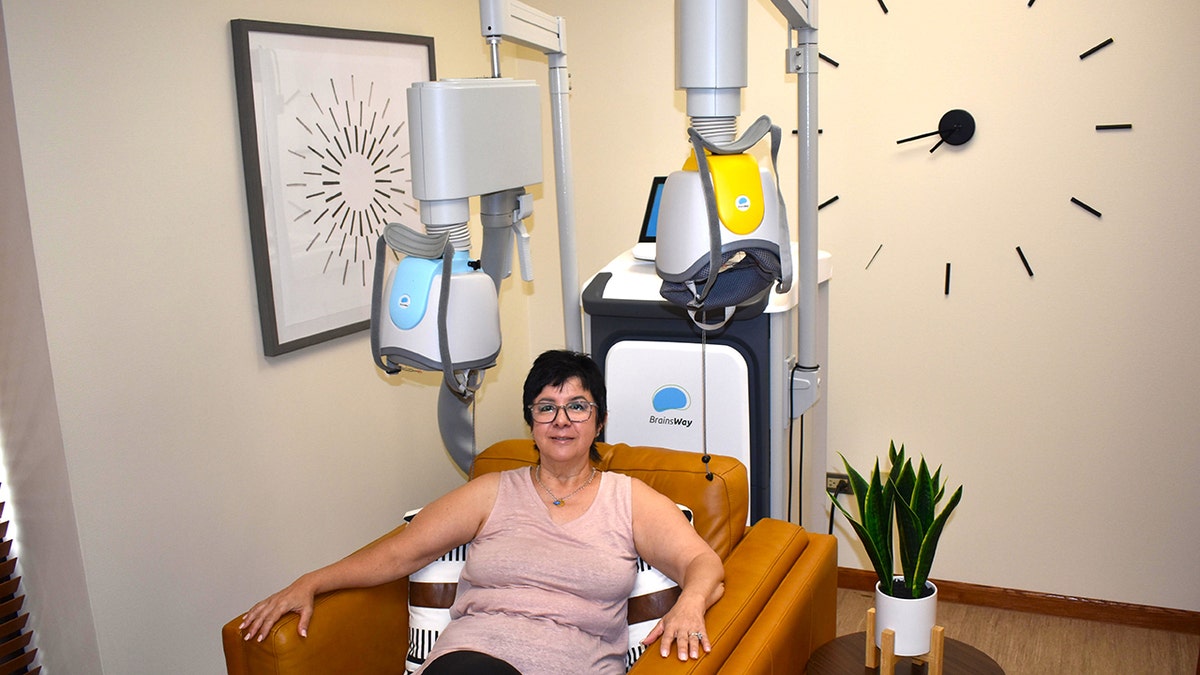
“If I hadn't had this treatment today, I don't know where I would be,” Gulden said. (Melanie Eilers)
“I know this may sound like a disadvantage, but it is also an advantage,” he said. “We're not doing anything permanent to the person's brain. We're temporarily changing the state of the brain.”
He added: “Generally speaking, we get you out of the state you were in… and then nature takes its course.”
Deep TMS can also be combined with other medications, such as antidepressants, Tendler added.

Dr. Fox News medical contributor Marc Siegel warned that deep TMS could potentially cause cognitive and behavioral changes, but overall called it a “very useful tool.” (Dr. Marc Siegel)
Dr. Fox News medical contributor Marc Siegel warned that deep TMS could potentially cause cognitive and behavioral changes, but overall called it a “very useful tool.”
He told Fox News Digital that deep TMS is also “very useful for movement disorders such as Parkinson's, with a high success rate.”
“We temporarily change the state of the brain.”
Siegel cautioned that deep TMS could potentially cause cognitive and behavioral changes, but overall called it a “very useful tool.”
“[Deep TMS is] “Research continues for various purposes to interrupt aberrant nerve conduction,” he said.
CLICK HERE TO DOWNLOAD THE FOX NEWS APP
For other medical professionals suffering from mental health issues, Gulden emphasized the importance of having a “healthy healthcare team,” especially after the pandemic.
“I don't care how strong you think you are,” she said. “You need to know what the signs are, and you need to know what treatments are available.”
For more health articles, visit foxnews.com.com/health.













